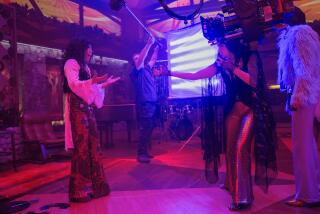Her Delivery Is ‘Loverly’
- Share via
Lyricist Alan Jay Lerner’s craft was one of hyperbole. Taking his themes to absurd levels (“Get Me to the Church on Time”) or to the realm of deeply held feelings capable of magic (“On the Street Where You Live”), Lerner’s lines are distinguished by exaggeration and over-the-top emotion.
As such, the songs that he wrote with composer Frederick Loewe for “My Fair Lady,” “Brigadoon,” “Gigi” and a score of others require a certain dramatic reserve in performance, so as not to trivialize them. When Richard Harris employed his considerable thespian talents while sing-speaking the words to “Camelot” for the 1967 movie, he did that beautiful song an injustice.
But that’s not the case with Diahann Carroll. Her performance Thursday during “Almost Like Being in Love: The Lerner and Loewe Songbook,” for a near-capacity crowd at the Orange County Performing Arts Center in Costa Mesa, struck the balance between theater and song.
Carroll interpreted the music succinctly and with a minimum of theatricality, letting the words establish their meaning without undo vocal or physical accouterment. The result was a show that presented Lerner and Loewe, as well as Carroll, in their best light.
Working with four male singer-dancers and backed by piano trio augmented with cello and saxophone, Carroll moved easily through a program of familiar and not-so-familiar Lerner and Loewe material.
The movement of the five performers, choreographed simply by director Mark S. Hoebee, seldom detracted from the music, and the constant exchange of leads and performer combinations was seamless.
Carroll’s brief between-tune patter revealed little about Lerner and Loewe--” . . . they were just special . . . both preferred boxing. . .”--leaving the music to speak for them.
Carroll’s voice changed, chameleon-like, to fit the material. Serious songs, including “If Ever I Would Leave You,” found that voice rich and rewarding, though of limited range. She injected touches of provocative baby-talk in “Show Me” and was comic, without overplaying, during a medley of “Wouldn’t It Be Loverly?,” “Why Can’t the English?” and “The Rain in Spain.”
*
Her partners--David Bedella, Jonathan Dokuchitz, Jonathan Leeds and David A. White--graced the performance with stirring three- and four-part harmonies, though, with the exception of Dokuchitz’s reading of “They Call the Wind Maria,” none was as effective singing solo.
Arranger Curtis McKonly, at the piano for this performance, showed respect for the original compositions, while adding interest with cello leads and percussion embellishments.
McKonly veered from tradition only in his arrangement of “Get Me to the Church on Time,” adding contemporary backbeat to the tune’s timeless message of manly fear, a trick that gave the familiar number new life.
The only time Carroll and company went over the top was at the beginning of the second act, during a medley of “The Night They Invented Champagne” and “I Could Have Danced All Night.” Here, the props--champagne glasses and a giant bottle--and the tipsy choreography overplayed what the lyric handled well enough.
The high jinx were immediately followed by the night’s most serious and least choreographed moments, Carroll’s singing of “I’ve Grown Accustomed to His Face” and “Gigi.”
More to Read
The biggest entertainment stories
Get our big stories about Hollywood, film, television, music, arts, culture and more right in your inbox as soon as they publish.
You may occasionally receive promotional content from the Los Angeles Times.










